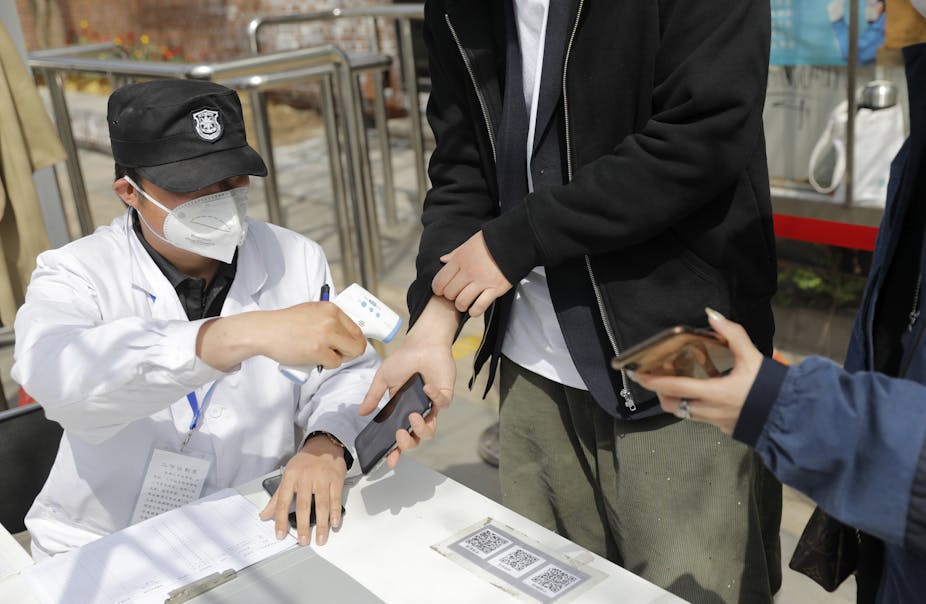After Wuhan, the initial epicentre of the coronavirus pandemic, was put into lockdown on January 23, around 80 Chinese cities adopted stay-at-home measures. Most of these are now being lifted, although various local restrictions remain.
Much was made during the lockdown of the coercive power of the Chinese Communist Party (CCP) in imposing restrictions on such a massive population and supporting them during the quarantine. But the Chinese government, like many other governments around the world, only has limited resources.
The Chinese private sector also played an important role in the enforcement of lockdown measures. China’s burgeoning consumer infrastructure and the diverse services run by private companies proved crucial in managing the lockdown, and are now central to the monitoring of daily life as restrictions lift.
Private security guards
China actually has a relatively small state bureaucracy compared to other countries. It’s estimated to have 2 million police officers, approximately 143 per every 100,000 people. This is far below the global average of 351 police officers per 100,000 population. It was unrealistic for China to enforce large-scale lockdown with this small police force, and it would have been logistically and politically difficult to deploy the army.
Instead, the task of controlling movements in urban communities across China fell to private security guards (bao an) employed by estate management companies (wuye gongsi). China has more than 5 million private security guards, thanks to the booming real estate market, which sold 1.7 billion square meters of property in 2019 – five times the size of Malta. Although concerns have been raised about the sustainability of China’s housing boom, services boosted by this market proved to be very useful during the coronavirus restrictions.
In today’s China, most newly developed private urban communities (xiao qu) have their own estate management company. The residents’ committees of some public housing blocks also contract with estate management companies. Each household needs to pay a service fee to the company. The system resembles British council tax, but the estate management companies can provide more dedicated and diverse services than local councils. Private security is one of them.

Before coronavirus, private security guards screened visitors at entrance gates of private housing blocks to prevent crime. During the stay-at-home measures, private security guards were tasked by estate management companies with checking the health records and body temperature of residents going out for essential travel. They were rescanned and sometimes disinfected upon return. Visitors were completely banned, apart from exceptional circumstances. To minimise essential travel, many estate management companies also took on the responsibility of ordering and delivering groceries to each household. Volunteers and social workers also helped provide people with what they needed during the strict quarantines.
Estate management companies are now involved in monitoring the phased easing of restrictions, and in particular the use of China’s new health code system, which shows a person’s infection risk.
Health code system
The health code system owes much to China’s booming ecommerce sector. What initially consisted of separate local monitoring schemes is now an integrated system that covers the whole country. By using a smartphone, people can report their health condition and travel history online and get a quick response (QR) code.
Confirmed COVID-19 patients are given a red code on a mobile app. The red code can turn green once a patient has undergone sufficient quarantine after a full recovery. Close contacts of infected people and suspected cases are marked in yellow. All other citizens are marked in green. Only people with a green code are permitted to travel and work.
The colour-coding system is combined with ubiquitous temperature checking in public locations. A green code can turn yellow if a temperature check sets off an alarm. When this happens, the affected person will be denied public services immediately. Visits by grassroots pandemic control units will soon follow.
Critics see the health code system as a massive surveillance initiative imposed by the autocratic CCP. But it wasn’t introduced by the central CCP. It was first launched in February by the municipal government of Hangzhou, the hometown of China’s giant online retailer Alibaba. The system was soon pushed across Zhejiang province, a powerhouse of China’s ecommerce sector that needed people to keep working in factories and warehouses.
The original system adopted by Hangzhou relied on technology support from Alibaba. Users obtain their individual codes through Alipay, an online transaction app used by 700 million Chinese consumers. QR technology had already become an integral part of online payments in China well before the COVID-19 pandemic.
Read more: How China is revolutionising e-commerce with an injection of entertainment
Thanks to the huge customer base of these commercial apps and the similar technology they use, it has been fairly simple to link the local systems together and form a national monitoring scheme.

During the lockdown, this QR technology designed to exploit Chinese buying power has been swiftly adapted for public administration purposes. Elsewhere in the world, US tech giants Google and Apple are partnering to create other contact tracking software. Despite environmentalists’ wider criticism of consumerism, the vast information infrastructure it has created has turned out to be an asset in the COVID-19 pandemic.

